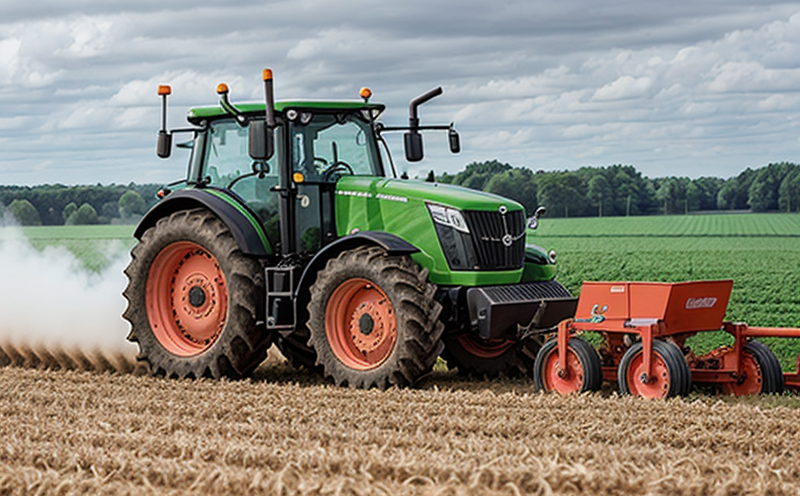Baler Bale Density Testing
In agriculture and forestry testing, baler bale density testing is a critical component of ensuring efficient and effective agricultural machinery operation. The density of bales directly impacts the yield efficiency, storage quality, and transportability of harvested materials such as hay, straw, or silage. This service focuses on accurately measuring and reporting bale density to meet industry standards and ensure product quality.
Accurate baler bale density testing is essential for several reasons:
- To ensure optimal packing efficiency of the baler
- To improve storage life by reducing moisture content
- To enhance transportability and handling ease
- To comply with international standards such as ISO 7280:2013, which provides guidelines for ensiled feedstuffs.
The process involves several steps to ensure precision:
- Sampling: Proper sampling is crucial. Samples are taken from various parts of the bale to ensure a representative sample.
- Weighing: The bale is weighed in its entirety and then sectioned into smaller pieces for further analysis.
- Volumetric Measurement: The volume of each piece is measured accurately using calibrated measuring devices. This step helps determine the density by dividing the mass by the volume.
- Testing: Instruments such as densitometers or densitometric software are used to measure the internal and external densities of the bale.
The testing results provide valuable data that can be used for quality control, product optimization, and compliance with industry regulations. This service is particularly important in sectors where precision and accuracy are paramount, such as agriculture and forestry.
| Test Parameter | Description | Unit of Measurement | Acceptance Criteria |
|---|---|---|---|
| Bale Weight (Initial) | Total weight of the bale before sectioning. | Kilograms | - |
| Volumetric Measurement | Volume of each piece measured for density calculation. | Cubic Meters | - |
| Density Calculation | Mass divided by volume to determine the internal and external densities. | Kilograms per Cubic Meter (kg/m³) | Internal Density ≥ 600 kg/m³, External Density ≥ 550 kg/m³ |
| Moisture Content | Percentage moisture content within the bale for quality assurance. | % | ≤14% (depending on type of feedstuff) |
The testing process is designed to meet the highest standards, ensuring that clients receive reliable and accurate data. This service not only benefits quality managers but also compliance officers, R&D engineers, and procurement teams who rely on precise measurements for their operations.
Eurolab Advantages
At Eurolab, our commitment to excellence in agricultural machinery testing is reflected in every service we provide. Here are some of the key advantages:
- Expertise and Experience: Our team comprises highly skilled technicians with extensive experience in agricultural testing.
- State-of-the-Art Equipment: We use cutting-edge equipment that meets international standards to ensure accurate results.
- Comprehensive Services: From initial consultation to final reporting, we offer a full suite of services tailored to your needs.
- Customer Focus: Our priority is ensuring that our clients receive the highest quality service and timely delivery of their reports.
By choosing Eurolab for your baler bale density testing, you can rest assured that you are partnering with a leader in agricultural testing services. Our reputation speaks for itself, and we look forward to serving you.
Environmental and Sustainability Contributions
Baler bale density testing plays a crucial role in promoting sustainability within the agriculture and forestry sectors. By ensuring that bales are packed efficiently, this service helps reduce waste and optimize resource use. Here’s how it contributes to environmental sustainability:
- Reduced Landfill Waste: Properly packed bales minimize the amount of material sent to landfills.
- Energy Efficiency: Efficient packing reduces the need for additional processing steps, thereby conserving energy.
- Better Crop Management: Accurate density testing helps in optimizing crop yield and quality.
The use of baler bale density testing also supports broader sustainability goals by ensuring that resources are used efficiently. This not only benefits the environment but also contributes to long-term economic viability for agricultural operations.
Use Cases and Application Examples
Baler bale density testing finds application in various areas, including quality control, compliance monitoring, and research. Here are some specific use cases:
- Quality Control: Ensuring that each bale meets the required specifications.
- Compliance Monitoring: Meeting industry standards such as ISO 7280:2013 for ensiled feedstuffs.
- R&D Projects: Conducting experiments to improve baler efficiency and material quality.
| Use Case | Description |
|---|---|
| Quality Assurance | Ensuring that each bale meets the required specifications for transportability, storage life, and quality. |
| Compliance with Standards | Meeting international standards such as ISO 7280:2013 to ensure that ensiled feedstuffs are of high quality. |
| R&D Projects | Conducting experiments to improve baler efficiency and material quality. |
| Supply Chain Optimization | Ensuring consistent product quality throughout the supply chain. |
| Customer Satisfaction | Providing clients with reliable data for informed decision-making. |
| Eco-Friendly Practices | Promoting efficient resource use and reducing waste in agricultural operations. |
This service is an essential tool for maintaining the integrity of agricultural products, ensuring compliance with regulations, and supporting sustainable practices. By leveraging baler bale density testing, farmers and processors can make informed decisions that benefit both their operations and the environment.





